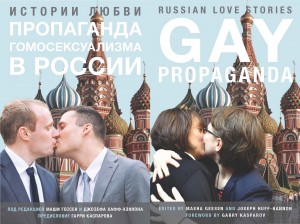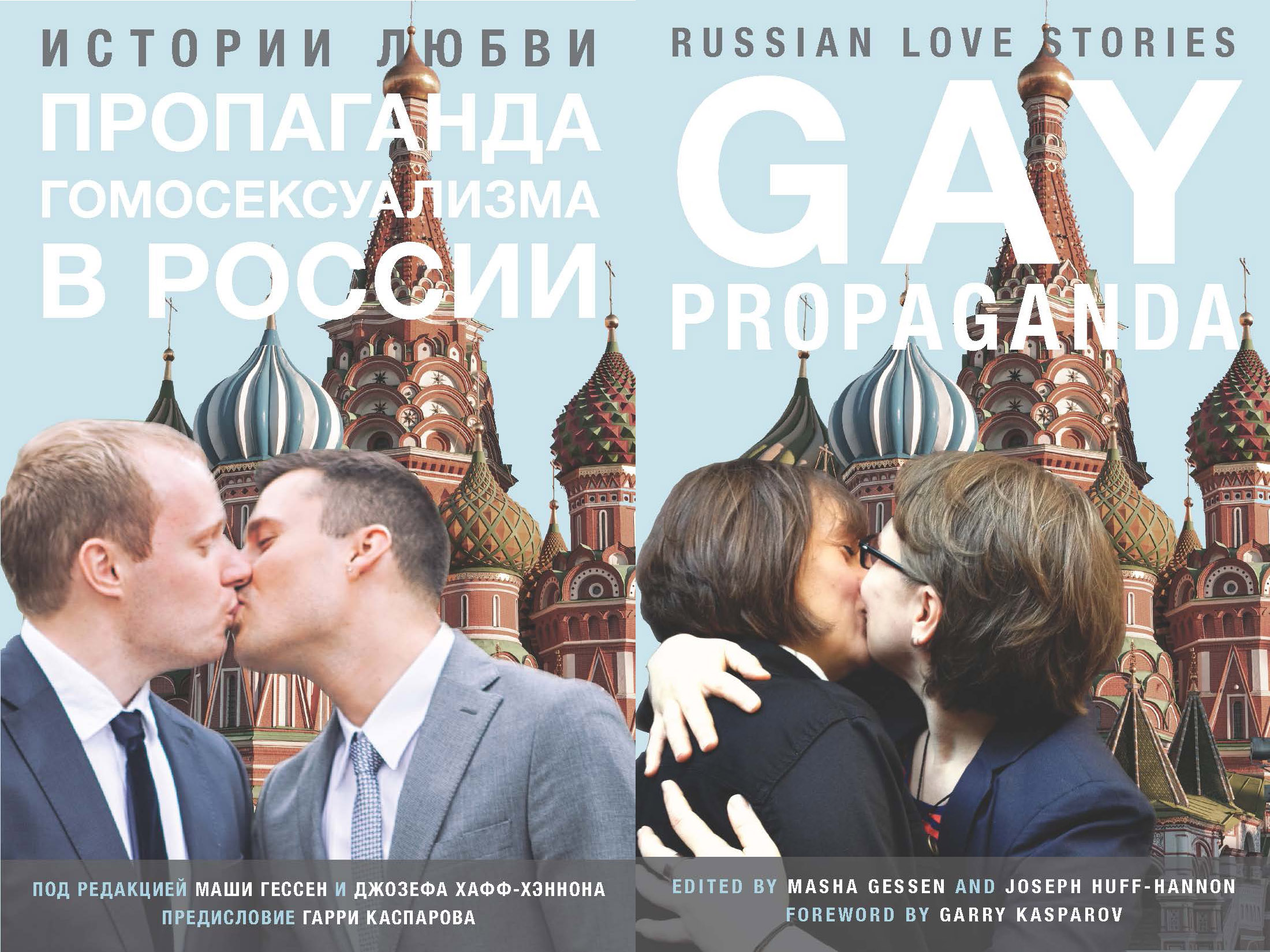Gay Propaganda: Russian Love Stories (ed. Masha Gessen & Joseph Huff-Hannon)
-By Richard T. Watson–
[Ed: This post, its subject, the distributing/promoting/reading of this post and of its subject, are probably illegal in Russia – a democratic major world power with 142.5 million people, holding a permanent seat on the UN Security Council, and the host in February 2014 of probably the world’s third largest sports event, the Winter Olympics]
The democratic credentials of Putin’s Russia have been getting shakier and shakier in recent years (cf. Pussy Riot). After the suppression of pro-democracy protests in 2013 and the Kremlin’s ongoing support for Syria’s President Assad, the last thing President Putin needs is a new law that crushes the basic freedoms of millions of his own people at the same time that Russia enters the global sporting spotlight.
Unfortunately, in June 2013, Russia passed a law banning the promotion of ‘non-traditional’ lifestyles and the implication that homosexual relationships have an equal footing with heterosexual (read ‘normal’) ones. While homosexuality remains legal, there are fewer and fewer protections against hate crimes, and greater implication that being gay is not ok.
As I sit writing this (in relative safety in Britain), tens of millions of people around the world are watching the Opening Ceremony of the 2014 Winter Olympics in Sochi, Russia. There were some good bits with huge, floating Soviet heads and a ring that failed to open up. It’s traditional for Olympic Opening Ceremonies to celebrate the achievements and values of the host nation; you might remember London 2012’s Opening Ceremony celebrated the Industrial Revolution, the NHS, British film and Shakespeare. With a global audience, you want to put your best wares out on the market.

Campaigners around the world are using the Sochi Games to draw global attention to Russia’s new homophobic law. That campaign includes a rapidly-constructed collection of Russian LGBT love stories from OR Books, published in English and Russian, just in time for the Opening Ceremony. They call it Gay Propaganda, but it’s not shout-it-from-the-rooftops brainwashing, and it won’t try to change the world. But it might change people’s lives – their personal, intimate lives, if not public, global lives. It’s not as loud or bright as Pussy Riot, but it might have a longer-lasting effect.
Like the best propaganda, this isn’t about trying to change people’s minds; it’s not trying to persuade homophobes or even to legitimise gay relationships. It’s a book for the people in Russia (and dozens of other territories with homophobic laws and practices) whom this law punishes, reminding them that they are not alone. There are people who share their worldview, even when it seems that their friends, neighbours and their state are set against them. This is a book that knows homosexual relationships don’t need outside validation. Its distribution – illegally in Russia – is underground and covert, with the Russian-language ebook freely available for download. It is a book with a small printing run, to be read underground, on the edges of publishing; genuinely dangerous in the challenge it offers to attitudes and authoritarian dogma in Russia and around the world.
You can get an idea of what the introduction by Garry Kasparov’s like by reading this piece from the Guardian’s website today. But the stories aren’t as overtly political as the chess-grandmaster-turned-political-activist. They are honest, real and personal, deeply personal. They’re told by gay, lesbian and transsexual Russians in Russia and by some who’ve left for one reason or another – usually because Russia wasn’t a country that accepted their sexuality.
They’ve got their touching moments – people discovering their feelings, surprising themselves with their sexuality, deciding to make a go of relationships that don’t conform to the society around them – but although they’re love stories, they aren’t fairy tales. The lives are still being lived, the new law makes those lives difficult – if not illegal – and there aren’t happy endings here, as such. Sure, the couples who contribute their stories feel safe enough to do so, but the editors admit they spoke to people too scared to share, and it’s clear that the trend in Russia is not towards greater tolerance of ‘non-traditional’ lifestyles.

I urge you to read this if you can get hold of it. But more importantly, I urge you to take note of the issues raised and the freedoms at stake. There are organisations (like All Out, currently pressuring Olympic sponsors to speak out) working against Russia’s homophobic law and similar laws elsewhere, particularly during the two weeks of the Winter Olympics in Sochi. Check them out, support them, and don’t stay silent while laws like this are allowed to stand, and state-sponsored prejudice goes unchecked.




